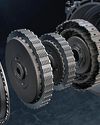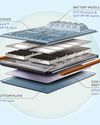
Thirty-six-year-old Stephen worked at Ford’s Chennai factory for nearly 15 years and earned around Rs 72,000 per month. Today, he struggles to find a job to support his family and to pay the EMI for the house he bought. The key reasons for this are his age, the high salary he earned at Ford and the history of unionism and strikes in Ford. Stephen is not alone. Hundreds of former Ford workers see a question mark over their future due to these same factors.
In September 2021, Ford India announced its decision to stop vehicle assembly at their factory in Sananad, Gujarat by the fourth quarter of 2021, and vehicle and engine manufacturing at their factory in Maramali Nagar, near Chennai by the second quarter of 2022.
Stephen, Mahesh and Shankar are among the four thousand employees who have lost their jobs because of this decision. They have all worked in the Ford factory for 10 to 15 years. Stephen and his friends have applied to many companies but have faced rejection everywhere. A few of them have now started driving auto rickshaws, hired cars or attached themselves to ride-sharing companies.
This scarcity of jobs is even though they live in the heart of a thriving auto hub. Today, Chennai is one of the largest automobile hubs in the world and new brown- and green-field projects are being announced regularly. Tamil Nadu is one of the top 10 automobile hubs in the world and home to India's top auto clusters.
Denne historien er fra 15th October 2022-utgaven av Autocar Professional.
Start din 7-dagers gratis prøveperiode på Magzter GOLD for å få tilgang til tusenvis av utvalgte premiumhistorier og 9000+ magasiner og aviser.
Allerede abonnent ? Logg på
Denne historien er fra 15th October 2022-utgaven av Autocar Professional.
Start din 7-dagers gratis prøveperiode på Magzter GOLD for å få tilgang til tusenvis av utvalgte premiumhistorier og 9000+ magasiner og aviser.
Allerede abonnent? Logg på

Spain's Fersa Group invests in India-based Delux Bearings
Besides theRs100 croreinvestment, the Indian company gets access toadvanced technologies and bearings with arange of applications that willhelpinits global growth strategy, writes Manobhava Baruah.

Tata Autocomp to open compact dual-clutch transmission plant
Amidthe country’s growing need for personal mobility with easy manoeuvrability, comes the demand for vehicles with automatic transmission. Tata AutoCompisready tomovein writes Shruti Mishra.

Pankaj Munjal-backed Hero Motors raises equity from GEF Cap
The company willinvest Rs1,500 crore over thenextthree years andit expects 60 percent ofits turnover to come fromelectric vehicle parts. Itaims to becomea Global EV Solutions Company from India

New age thermoplastics for next-generation EV batteries
Saudi-based global materials major SABIChas developed cutting edgein fire-resistant polymers and flame-retardant materials that comply with various EV battery safety standards across the world.

Switch Mobility to meet growing e-bus demand with fresh capex
Oncourse for abillion-dollar business, the company is exploringa possibility of operating satellite factories across the country to serve different geographies, write ShahkarAbidi and Ketan Thakkar.

Kia India to invest Rs 2,000 crore in EVS, to introduce new e-RV in 2025
New investmentto drive R&D, infrastructure development and manufacturing capabilities. The company willlocally produce EVsin India with possibility of exports as well, writes Mayank Dhingra.

"The government has given enough time for indigenisation but the industry has not taken it seriously"
Amitabh Saran, Founder and CEO, Altigreen, shares his views on problems inthe EV industry and battery localisation solutions with Amit Vijay M.

TATA MOTORS SEES ONE INTWO CARS SOLDAS EVS BY 2030
The company aims to offer wider choices withnew EVs that may straddle a pricebracket of Rs20to 40lakhinthe coming years, writes Ketan Thakkar.

MG Motor India in expansion drive, to invest $100 million
The investment willbe usedtoramp up existing production capacity from1.2to1.4-15lakh units per annum atthe automaker's Halol plantin Gujarat, writes Ketan Thakkar.

"Technology and its multiplier effect are driving business transformations and customer experiences"
Technical Centre India is one of Continental’s largest research and development centres in the world, andasa Centre of Competence’ it also develops customised products for the BRIC countries.